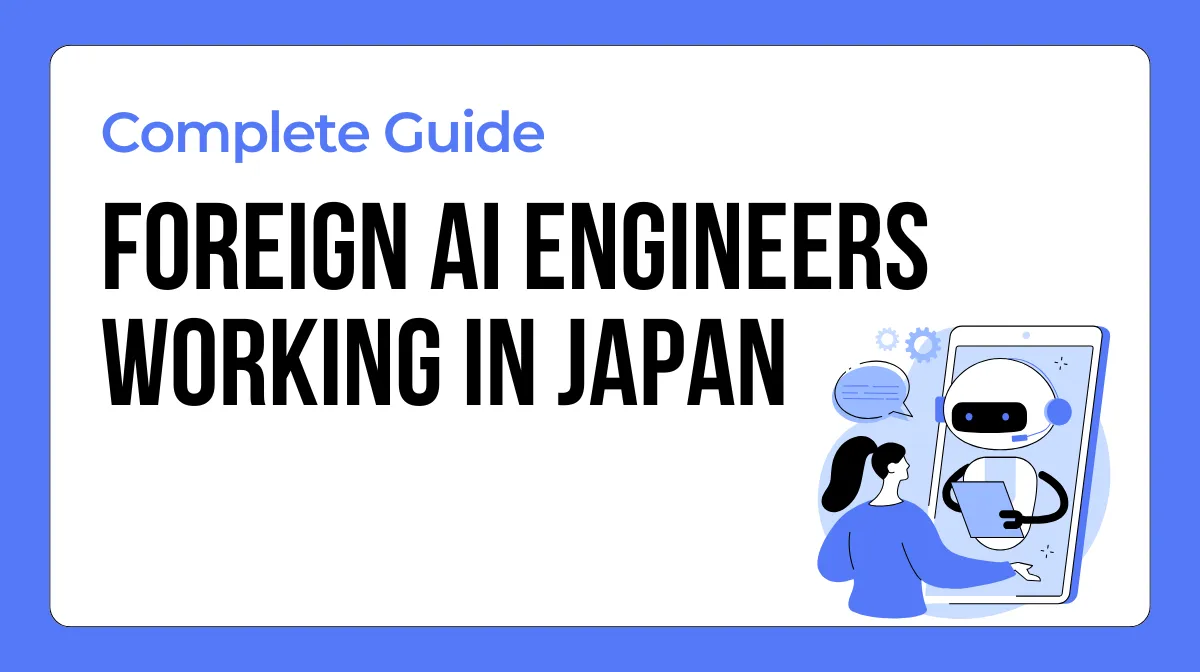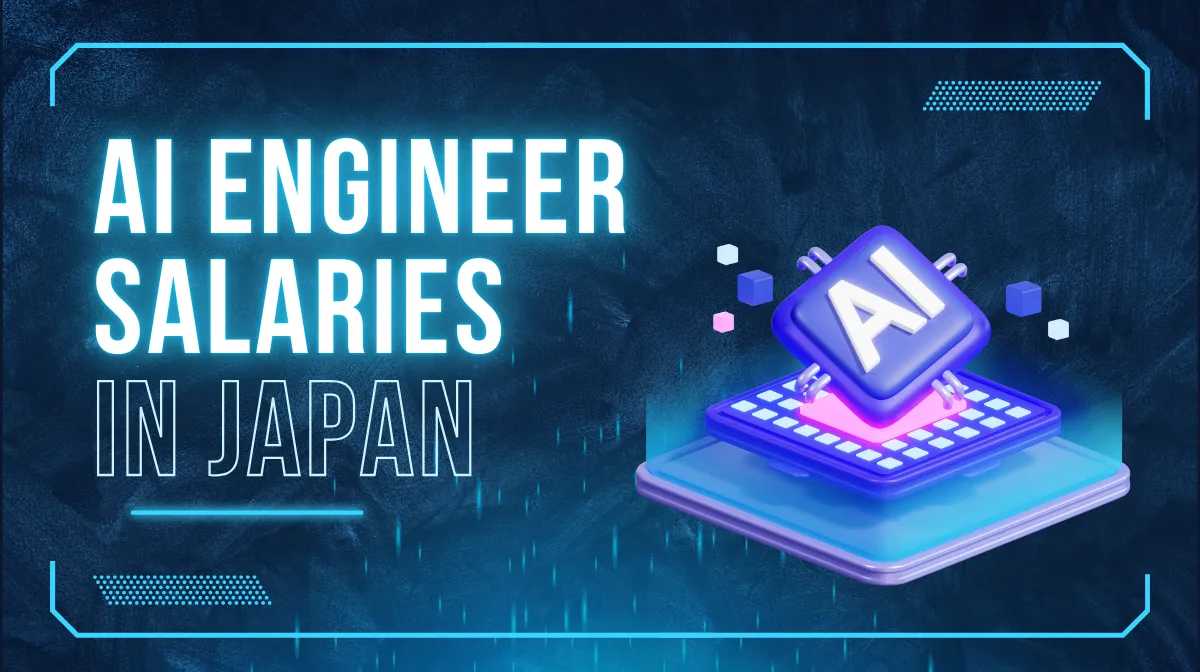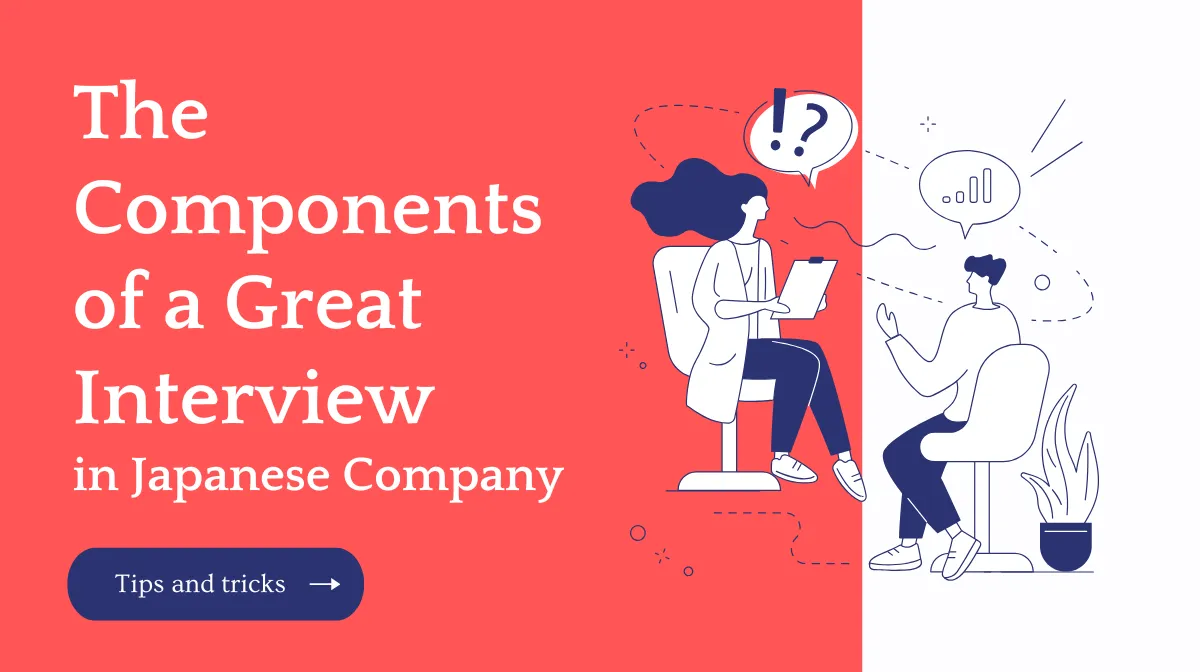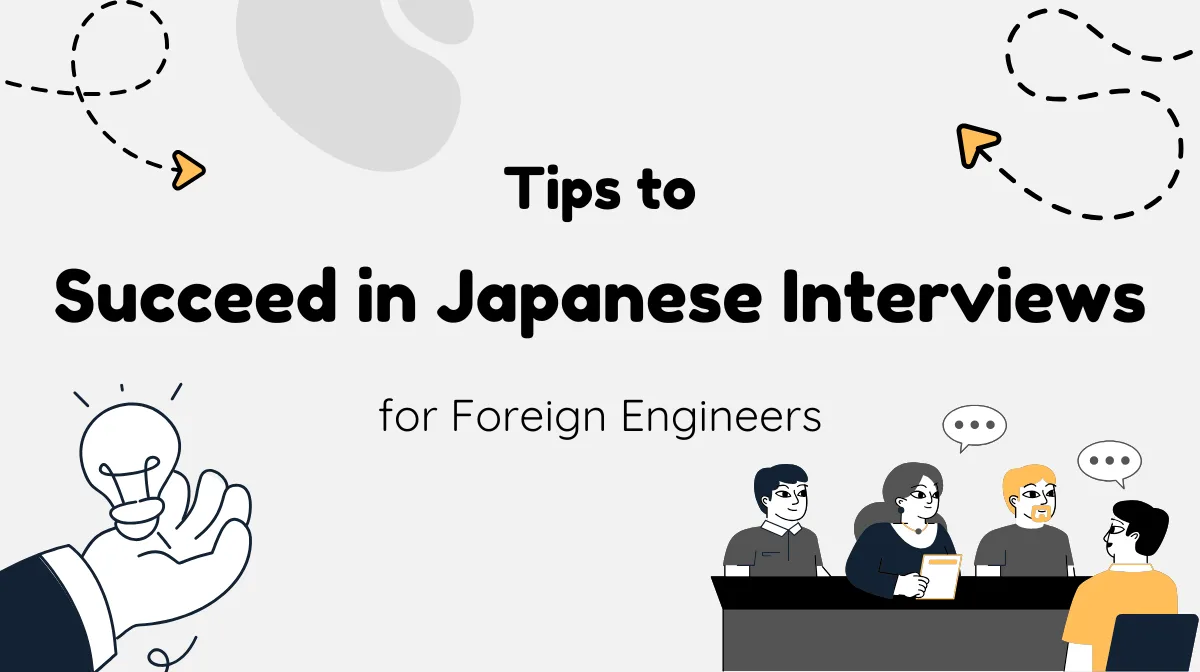Japan’s AI industry continues to experience rapid growth, driving increased demand for foreign AI engineers. While language barriers and cultural differences present challenges, attractive environments are emerging with high-level compensation and comprehensive support systems.
This article provides detailed practical information for foreign AI engineers who want to succeed in Japanese companies, covering everything from market trends and company information to application strategies.
- You’ll discover Japan’s AI job market demand, salary ranges, and visa requirements for foreign engineers.
- You’ll learn about top Japanese AI companies hiring international talent with English work environments.
- You’ll gain practical strategies for successfully applying to Japanese AI positions and cultural adaptation.
1. Japan’s AI Engineer Market and Demand for Foreign Talent
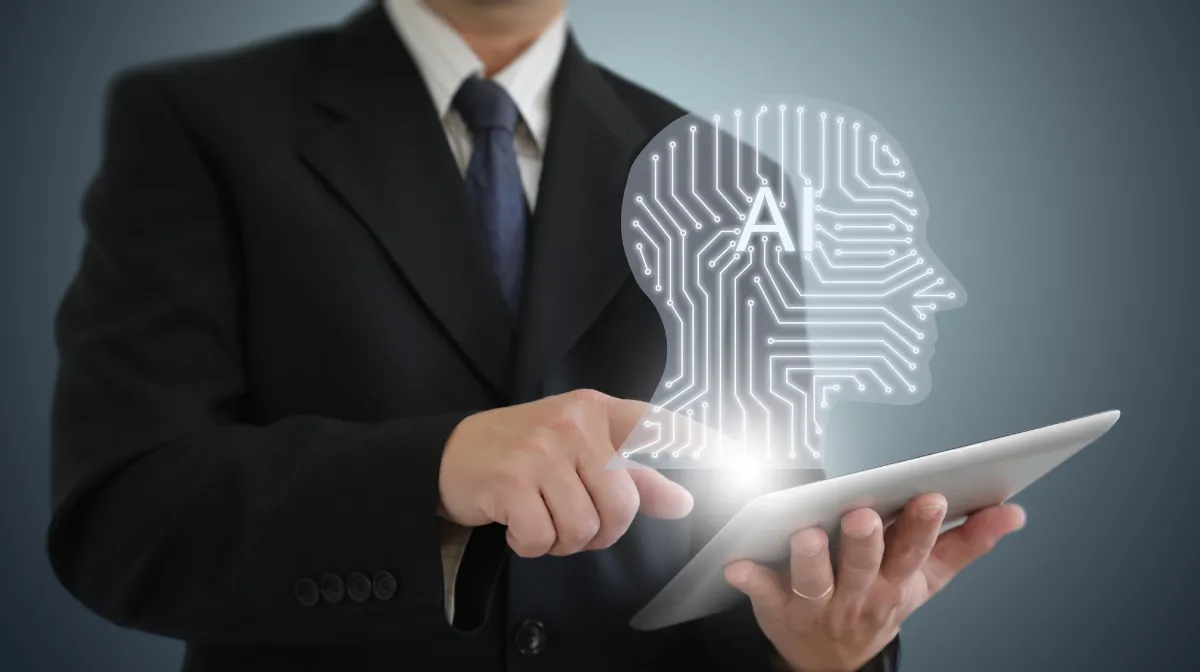
Japan’s AI market continues to expand rapidly, and the demand for AI engineers is steadily increasing. However, with domestic AI talent supply unable to keep pace, expectations for foreign AI engineers are rising.
Here, we will explain in detail the current state of Japan’s AI market and the demand for foreign AI engineers.
Japan’s AI Companies Face Talent Shortages and Expectations for Foreign AI Engineers
Japan’s AI industry is growing rapidly while facing a serious talent shortage. According to a survey by the Ministry of Economy, Trade and Industry, approximately 790,000 IT professionals are predicted to be in short supply by 2030, with the shortage of engineers with AI development expertise being particularly pronounced.
To fill this talent gap, many Japanese companies are becoming increasingly active in recruiting foreign AI engineers.
What Japanese Companies Expect from Foreign AI Engineers
- Introduction of advanced AI technologies and knowledge from overseas
- Product development and service design from a global perspective
- Strengthening access to overseas markets through multilingual support
- Diversification and innovation of internal technology stacks
In fact, from major IT companies to emerging AI startups, many companies are strengthening their efforts to recruit foreign engineers by translating their recruitment pages into English and clearly indicating work visa support.
Demand is particularly notable for engineers with high technical skills in specialized fields such as deep learning, natural language processing, and computer vision.
Growth Projections and Job Market Trends for AI Engineers in Japan
Japan’s AI market is predicted to grow to a scale of 1 trillion yen in the future, and in proportion to this, job openings for AI engineers are also on an increasing trend.
According to data from major job sites, the number of AI-related job openings has increased significantly, with growth rates far exceeding other IT positions.
AI Market Growth Areas
- Manufacturing: Image recognition and anomaly detection systems
- Financial Industry: Fraud detection and automated trading systems
- Medical Field: Diagnostic support and drug discovery research
- Retail/Service Industry: Personalization and demand forecasting
- Autonomous Driving and Robotics: Machine learning applications
Characteristics of AI Engineer Job Openings
- Rising salary ranges (especially for experienced professionals)
- Increased options for remote work and hybrid work
- Growth in workplaces where work in English environments is possible
- Expansion of benefits such as residency status support and relocation assistance
- Increased provision of stock options at startups
Strengths of Foreign AI Engineers Valued by Japanese Companies
The reasons why foreign AI engineers are highly valued by Japanese companies include not only technical skills but also unique perspectives and problem-solving approaches born from diverse backgrounds.
In fact, many companies that actively recruit foreign AI engineers report outcomes such as increased speed of technological innovation, smooth progress of international projects, and entry into new markets.
With the accumulation of such success stories, demand for foreign AI engineers is predicted to continue growing.
Technical Strengths
- Learning experience at advanced educational institutions and research facilities overseas
- Familiarity with the latest AI technology trends
- Experience participating in international AI communities and open source projects
- Practical project experience and flexible technology application abilities
Global Perspective Strengths
- Creative problem-solving approaches from diverse cultural backgrounds
- Communication abilities in English and other languages
- Understanding of international business practices
- Insights into overseas market needs
Foreign engineers with experience at famous overseas AI research institutions or major tech companies often receive high evaluations for their expertise and track record.
Additionally, the networks and cultural backgrounds of foreign engineers are recognized as valuable assets in Japanese companies’ global expansion.
2. Skills and Roles Required by Japanese Companies for AI Engineers

The job title “AI Engineer” actually encompasses a wide range of specializations and roles. Understanding the job content and skill sets that Japanese companies expect from AI engineers is crucial for foreign engineers building their careers.
Here, we will explain the roles of AI engineers in Japanese companies, required technical skills, and language/communication requirements specific to foreign engineers.
Main Job Responsibilities and Role Division for AI Engineers
The responsibilities of AI engineers in Japanese companies vary greatly depending on company size and industry, but are generally classified into the following roles:
- Data Scientist
Data analysis, statistical modeling, machine learning model construction and evaluation - Machine Learning Engineer
Implementation and optimization of machine learning algorithms, deployment to production environments - AI Architect
Design of overall AI systems, infrastructure construction, ensuring scalability - AI Researcher
Latest AI technology research, paper investigation, verification and application of new methods - Data Engineer
Data pipeline construction, data cleansing, ETL process management
In large companies, the above roles are often clearly separated, but in startups and SMEs, it’s not uncommon for one AI engineer to take on multiple roles.
For foreign engineers in particular, roles are often set flexibly according to their expertise and experience.
Industry-Specific AI Engineer Responsibilities
- Manufacturing: Image recognition for quality control, predictive maintenance, process optimization
- Finance: Fraud detection, risk analysis, automated trading system development
- Medical Field: Medical image diagnostic support, disease prediction, drug discovery research
- Retail: Demand forecasting, recommendation engine development, customer analysis
- Automotive/Robotics: Autonomous driving algorithms, sensor data processing, behavior prediction
Recently, with the rise of Generative AI, new specialized fields such as large language model (LLM) utilization and RAG (Retrieval-Augmented Generation) system construction are rapidly expanding in addition to traditional AI engineer roles.
Technical Skills and Experience Valued by Japanese AI Companies
The technical skills Japanese companies require from AI engineers range from basic programming abilities to specialized machine learning knowledge.
Analysis of major job postings reveals that the following skills are particularly valued:
Essential Technical Skills
- Programming languages (Python, R, Java, C++)
- Machine learning frameworks (TensorFlow, PyTorch, Keras, scikit-learn)
- Data processing and analysis (Pandas, NumPy, SQL, Spark)
- Version control and development environments (Git, Docker, CI/CD)
- Cloud platforms (AWS, GCP, Azure)
Field-Specific Skills
- Computer Vision: OpenCV, image processing algorithms, CNN architectures
- Natural Language Processing: BERT, GPT, tokenization, embeddings, morphological analysis
- Recommendation Systems: Collaborative filtering, content-based filtering
- Speech Recognition: Voice feature extraction, speech conversion algorithms
Experience
Not just technical knowledge, but actual track records of solving business challenges with AI are highly valued. Particularly valued are
- End-to-end AI project experience (from conception to implementation and operation)
- Machine learning model development experience with large-scale datasets
- AI system operation experience in production environments
- Writing papers and technical articles, presenting at international conferences
- Contributing to open source projects
Japanese Company Characteristics
There’s a tendency to value implementation abilities and operational experience, not just theoretical knowledge. Also, generalist abilities that can solve problems by combining multiple technologies are often valued over specialists focused on specific technologies.
Language Abilities and Communication Skills Required for Foreign AI Engineers
The language abilities required for foreign AI engineers vary greatly depending on the company and specific role. As a recent trend, companies prioritizing securing excellent AI talent are increasingly relaxing language requirements.
■日本でエンジニアとしてキャリアアップしたい方へ
海外エンジニア転職支援サービス『 Bloomtech Career 』にご相談ください。「英語OK」「ビザサポートあり」「高年収企業」など、外国人エンジニア向けの求人を多数掲載。専任のキャリアアドバイザーが、あなたのスキル・希望に合った最適な日本企業をご紹介します。
▼簡単・無料!30秒で登録完了!まずはお気軽にご連絡ください!
Bloomtech Careerに無料相談してみる
3. AI Engineer Salary Ranges and Treatment of Foreign Talent

When considering working as an AI engineer in Japan, salary levels and treatment are among the most important decision factors. For foreign engineers in particular, since it involves decisions about relocation, economic conditions should be carefully considered.
Here, we will explain in detail the salary ranges for AI engineers at Japanese companies, differences based on experience and skill levels, and treatment specific to foreign talent.
Average Salary Data for AI Engineers at Japanese Companies
The salaries of AI engineers in Japan are at a somewhat higher level compared to general IT positions. Against the background of talent scarcity and high specialization, the average salaries of AI engineers are trending upward year by year, and compensation for excellent talent is approaching international standards.
AI Engineer Basic Salary Range (Latest 2025)
- General salary band: ¥5-15 million
- Median: Approximately ¥8 million
- Top tier (top 10%): ¥15 million and above
Notably, foreign companies and some tech companies are increasingly adopting compensation systems close to international standards for particularly excellent talent. This may include performance-linked bonuses, stock options, and sign-on bonuses in addition to base salary.
Regional Trends
- Tokyo, Osaka, Nagoya: ¥5.5-14 million (little difference, with Tokyo slightly higher)
- Other regional cities: ¥4.5-12 million
Company Size Trends
- Major IT companies/Foreign companies: ¥7-20+ million
- Mid-tier IT companies: ¥6-13 million
- Startups: ¥5-12 million (+ stock options, etc.)
Industry Trends
- IT/Tech industry: Highest level (average around ¥9 million)
- Finance/Insurance industry: Relatively high level (average around ¥8.5 million)
- Manufacturing: Medium to high level (average around ¥7.5 million)
- Retail/Service industry: Medium level (average around ¥7 million)
AI Engineer Salary Comparison by Experience and Skill Level
AI engineer salaries also vary greatly according to experience years and skill levels. Particularly in Japan, there’s a strong trend toward evaluating track records and skills rather than career paths from new graduates.
| Experience Level | Salary Range | Main Roles/Positions |
|---|---|---|
| Entry Level (0-2 years) | ¥4-6 million | Junior AI Engineer, Research Assistant |
| Mid Level (3-5 years) | ¥6-9 million | AI Engineer, Data Scientist |
| Senior Level (5-10 years) | ¥8-12 million | Senior AI Engineer, Tech Lead |
| Expert (10+ years) | ¥10-18 million | AI Architect, AI Specialist |
| Top Level | ¥15-20+ million | AI Director, Chief AI Officer, etc. |
Notably, with the recent generative AI boom, there’s a sharp increase in demand for engineers familiar with cutting-edge technologies like large language models (LLMs) and diffusion models. It’s not uncommon for these specialists to be offered 20-30% higher compensation than regular AI engineers.
However, skills and achievements have a greater impact on salary than pure years of experience
- Contributions to cutting-edge AI research (paper publications, patent acquisitions, etc.)
- Work experience at major tech companies like GAFAM
- Experience leading large-scale AI projects
- Deep knowledge in specific AI specializations (deep reinforcement learning, generative AI, etc.)
- Track record of AI implementations with business impact
Special Treatment and Benefits for Foreign AI Engineers
Japanese companies are increasingly providing various special treatments and support in addition to regular benefits to secure excellent foreign AI engineers. These are separate from salary and are designed to support foreign engineers’ lives in Japan and promote long-term retention.
Visa and Immigration Support
- Full support for work visa acquisition (application procedure agency, cost coverage)
- Support for highly skilled professional visa acquisition
- Family visa support
- Relocation cost assistance (partial or full coverage of international moving costs)
- Initial life setup support (bank account opening, resident registration, etc.)
Housing Support
- Housing allowance (typically ¥50,000-150,000 per month)
- Company housing/dormitory provision
- Real estate agent introduction and guarantor support
- Initial cost assistance for rental contracts
Language and Cultural Support
- Free or subsidized Japanese lessons
- Cultural adaptation programs
- Interpreter/translation services
- HR/administrative staff capable of English support
Global-Compatible Benefits
- International health insurance
- 1-2 annual home leave/travel cost assistance
- Flexible work systems (remote work, flextime)
- Global holiday accommodation (permission to take leave on home country holidays)
Career Development Support
- Support for participation in international conferences
- Dispatch to overseas training programs
- Internal training in English
- Global networking opportunities
■ Related Reading
The following article provides detailed information about AI engineer salaries in Japan.
4. Visas and Legal Procedures for Foreign AI Engineers

Appropriate residence status (visa) is essential for working in Japan. AI engineers are highly specialized professionals, and there are multiple visa options suitable for them.
Here, we will explain in detail the types and conditions of work visas that AI engineers can apply for, the point system for highly skilled professional visas, and visa support by companies.
Types and Conditions of Work Visas Available to AI Engineers
The main work visas that foreign AI engineers can apply for to work in Japan are as follows:
◎ Engineer/Specialist in Humanities/International Services Visa
This is the most common visa type for AI engineers.
- Eligible: Personnel with specialized education in fields such as computer science, AI, and information engineering
- Validity: 1, 3, or 5 years (renewable)
- Main Requirements: University/vocational school degree/graduation certificate in AI-related or information engineering fields, or 10+ years of practical experience in the same field
◎ Highly Skilled Professional Visa (Type 1)
A visa with preferential treatment for AI engineers with high specialization.
- Eligible: Highly skilled professionals who score 70+ points in the point system
- Validity: 5 years (can transition to Highly Skilled Professional Type 2)
- Main Preferential Treatment:
- Permission for multiple activities (can work multiple jobs)
- 5-year residence period granted
- Relaxed employment permission requirements for spouses
- Permission to bring parents and domestic helpers under certain conditions
- Shortened period for permanent residence application (normally 10 years → 3 years for highly skilled professionals)
◎ Highly Skilled Professional Visa (Type 2)
A visa with greater freedom that can be transitioned to from Highly Skilled Professional Type 1.
- Eligible: Those who have been active with Highly Skilled Professional Type 1 visa for 3+ years, or those who score 80+ points in the point system
- Validity: Indefinite
- Main Preferential Treatment:
- No restrictions on residence period (no renewal required)
- All preferential treatment of Highly Skilled Professional Type 1
- Significant relaxation of activity restrictions (work other than AI engineer possible)
◎ Specified Skilled Worker Visa
A relatively new visa category established in 2019.
- Eligible: Personnel with certain skills in specific fields such as IT
- Validity: Specified Skilled Worker Type 1: Maximum 5 years, Specified Skilled Worker Type 2: Indefinite (renewable)
- Main Requirements: Passing skill tests and Japanese language tests, or satisfactory completion of Technical Intern Training Program II
Key Points for Obtaining Various Visas
The most advantageous for AI engineers is the Highly Skilled Professional visa, which offers various preferential treatments, but if you cannot acquire the necessary points, the Engineer/Specialist in Humanities/International Services visa is a common choice.
Immigration bureau screening is strict, so it’s recommended to thoroughly verify that requirements are met before applying and seek advice from specialists (administrative scriveners, etc.).
Corporate Visa Sponsorship and Support Systems
Corporate sponsorship is essential for obtaining a visa to work in Japan. Companies active in recruiting foreign AI engineers have established comprehensive visa support systems. When choosing companies, it’s important to confirm visa support content.
Visa Support Comparison by Company Size
Large Companies
- Specialized teams available
- Full coverage of application costs is standard
- In-house specialists available
- Comprehensive family visa support
- Permanent residence acquisition support for long-term employees
SMEs
- Often outsourced
- Full or partial cost coverage
- Contract specialists available
- Basic support available
- Limited permanent residence acquisition support
Startups
- Limited visa application agency
- Application cost coverage depends on negotiation
- Limited legal advice
- Limited family visa support
- Little permanent residence acquisition support
Corporate Support Examples
Major IT Company A
- Specialized in-house team supports entire process
- Family visa applications also handled
- Full coverage of assignment costs
- Comprehensive support up to housing arrangements
AI Startup B
- Visa acquisition support by partner administrative scriveners
- Application cost coverage
- Flexible work arrangements (remote work-centered for immigration flexibility)
Foreign Company C
- International personnel movement support by Global Mobility team
- Utilization of transfer visas
- Support including family education
Particularly noteworthy is that many companies have recently established “Highly Skilled Foreign Talent Recruitment Programs” providing seamless support from pre-employment to immigration and employment.
This often includes not just visa applications but comprehensive life establishment support in Japan, including housing arrangements, bank account opening, and municipal procedures.
■日本でエンジニアとしてキャリアアップしたい方へ
海外エンジニア転職支援サービス『 Bloomtech Career 』にご相談ください。「英語OK」「ビザサポートあり」「高年収企業」など、外国人エンジニア向けの求人を多数掲載。専任のキャリアアドバイザーが、あなたのスキル・希望に合った最適な日本企業をご紹介します。
▼簡単・無料!30秒で登録完了!まずはお気軽にご連絡ください!
Bloomtech Careerに無料相談してみる
5. Five Major AI Companies Popular with Foreign AI Engineers

Japan has many major companies that are attractive to foreign AI engineers who want to work in global environments. These companies are taking advanced initiatives in English environment development, international R&D, and support systems for foreign talent.
Here, we will explain in detail five major AI companies particularly popular with foreign AI engineers and their recruitment processes and selection criteria.
Major Japanese AI Companies with Global Work Environments and Their Characteristics
The five companies introduced below are major companies that actively recruit foreign AI engineers and have established global environments. Let’s look at each company’s characteristics, strengths, and responses to foreign engineers.
Common to these major companies are English environment development, active recruitment of international talent, and comprehensive support systems for foreign engineers. Additionally, all spare no investment in cutting-edge AI technology and put effort into R&D environments.
Preferred Networks Inc.
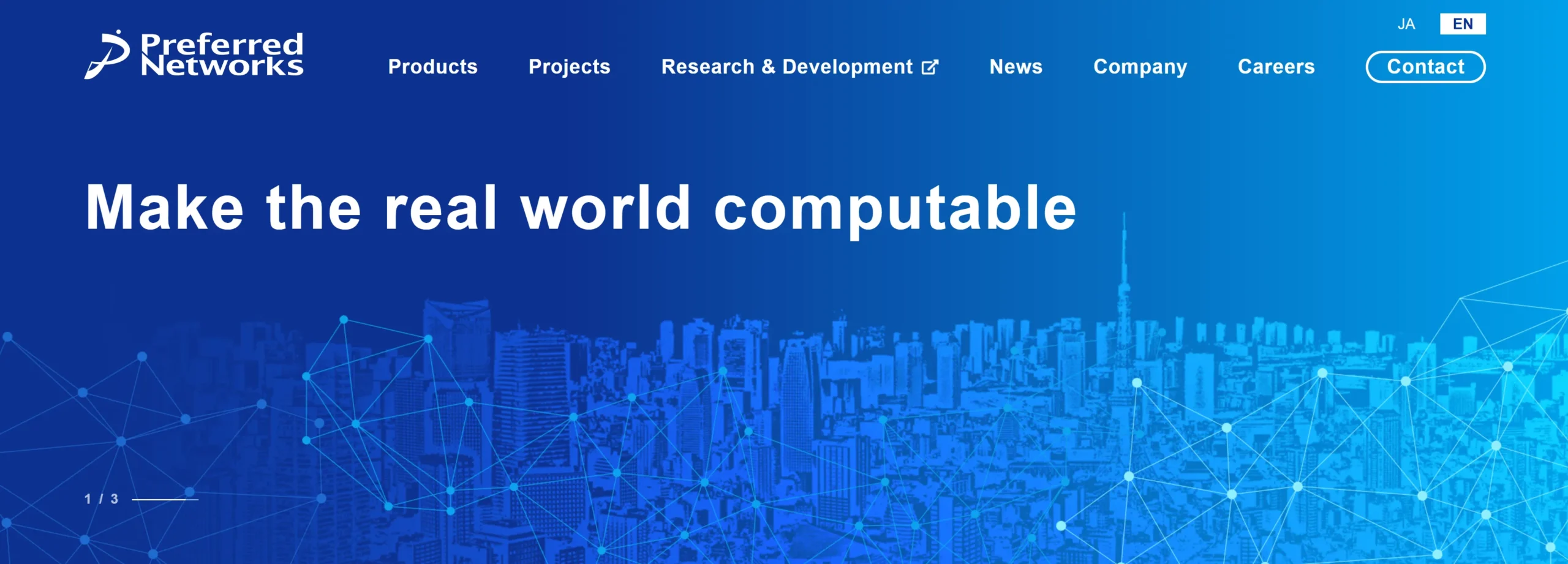
Since its founding, Preferred Networks has aimed for world-class AI research and development, providing a very attractive environment for foreign engineers.
It’s particularly popular with foreign AI engineers interested in cutting-edge AI research and development. The abundance of opportunities for open source project contributions and paper presentations at top conferences is also attractive.
- Founded: 2014
- Headquarters: Chiyoda-ku, Tokyo
- Employees: Approximately 300
- Main Business: R&D in manufacturing, medical care, autonomous driving using deep learning technology
- Recruitment Site Languages: Japanese/English
Features and Benefits
- Access to supercomputer-level computational resources
- Research environment with world-class research teams
- Internal corporate language uses both English and Japanese, with important documents and meetings supported in English
- Global network through partnerships with major domestic and international companies
- Foreign engineer support including comprehensive visa support, housing arrangement assistance, Japanese language learning programs
- International-standard salary system, performance-linked bonuses
ABEJA Inc.

ABEJA, which develops AI solutions centered on retail, actively recruits foreign engineers along with global business expansion.
It’s particularly attractive for engineers interested in AI implementation with business impact. The ability to gain experience handling actual business data is also a strength.
- Founded: 2012
- Headquarters: Minato-ku, Tokyo
- Employees: Approximately 120
- Main Business: AI platform for retail, image recognition technology, marketing AI
- Recruitment Site Languages: Japanese/English
Features and Benefits
- Practical environment applying AI to actual business challenges
- English environment where engineering teams primarily communicate in English
- Global expansion through international development in Singapore, US, etc.
- Foreign engineer support including visa support, housing allowance, Japanese/English training
- Flexible work including remote work and flextime systems
ExaWizards Inc.
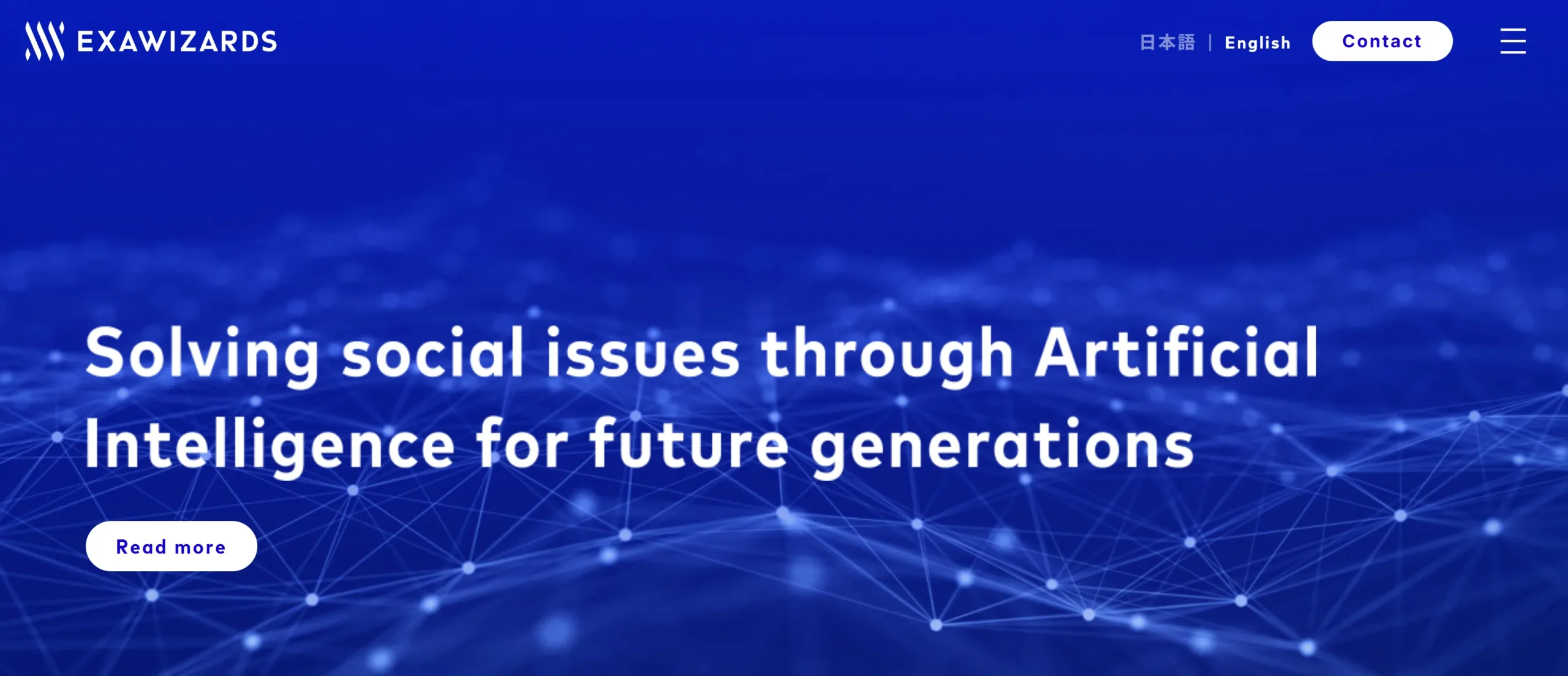
ExaWizards, which develops AI focused on solving social issues centered on medical and nursing care, values global environments where diverse talent works together.
It’s particularly supported by engineers interested in AI development with social impact. The ability to gain AI utilization experience in specialized fields like medical care and nursing is also attractive.
- Founded: 2016
- Headquarters: Minato-ku, Tokyo
- Employees: Approximately 570
- Main Business: AI for medical/nursing care, manufacturing AI, financial AI solutions
- Recruitment Site Languages: Japanese/English
Features and Benefits
- Clear mission of solving social issues
- Language environment where development teams can communicate in English
- Encouragement of academic presentations and paper submissions
- Flexible working styles including remote work, reduced hours, side jobs allowed
- Human resource development including mentor systems, internal study sessions, skill improvement support
Cybozu Inc.
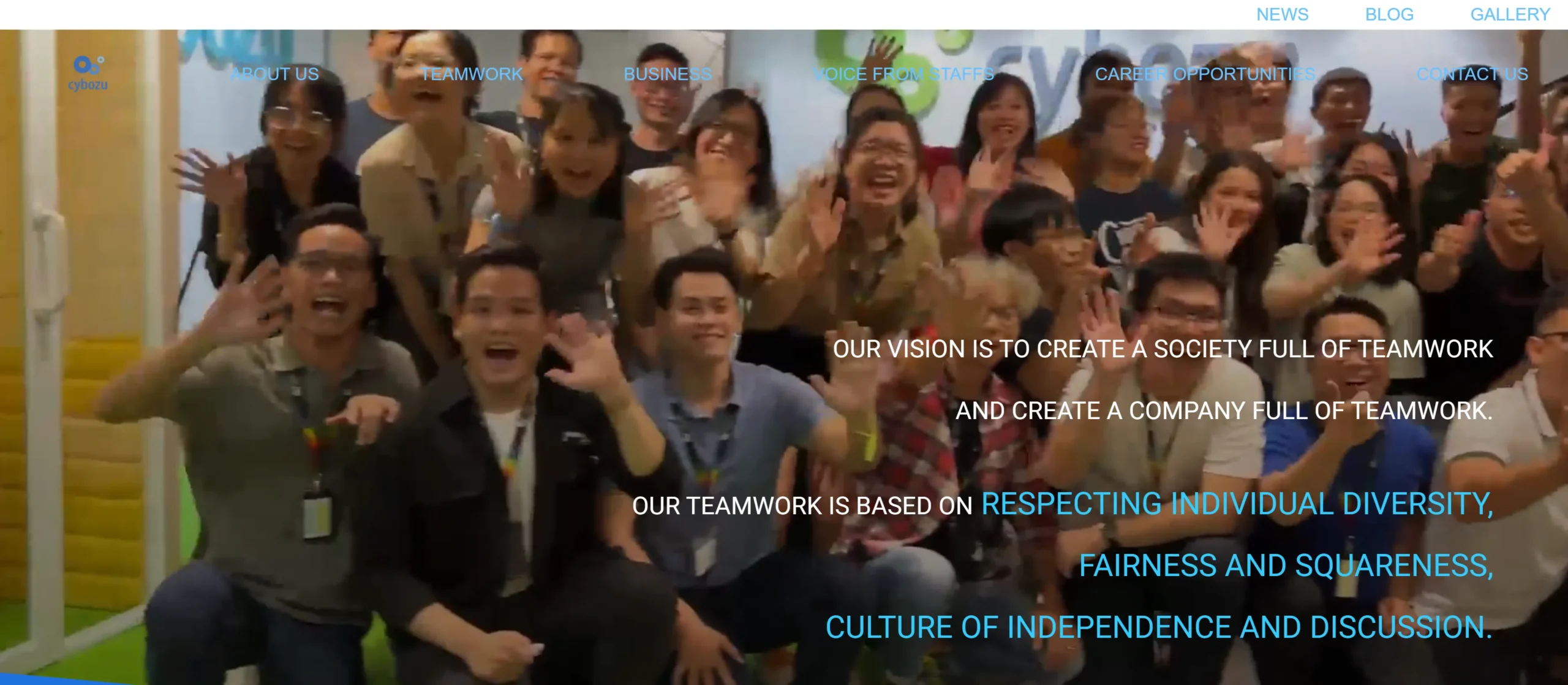
Known for enterprise groupware development, Cybozu is working on advancing and optimizing business communication using AI technology.
It’s particularly popular with engineers interested in data analysis of business communication and business process optimization, and those who want to be involved in work style transformation.
- Founded: 1997
- Headquarters: Chuo-ku, Tokyo
- Employees: Over 1,000
- Main Business: Cloud-type groupware, business app development platform
- AI Application Areas: Business communication analysis, business process optimization, information search and recommendation
Features and Benefits
- Development environment utilizing vast communication data within companies
- International teams through global expansion (US, China, Vietnam, etc.)
- Active investment in cutting-edge technology and open technical culture
- Clear career paths and evaluation systems
- Corporate culture that values work style diversity and comprehensive benefits
Sony AI

Sony AI, responsible for AI R&D for the Sony Group, advances AI utilization across entertainment, imaging, gaming, and other fields. It’s particularly attracting high interest from engineers interested in AI utilization in entertainment fields like creative AI and game AI.
- Founded: Sony (1946), Sony AI (2020)
- Japan Office Location: Minato-ku, Tokyo
- Employees: Over 110,000 group-wide
- Main Business: Game AI, creative AI, imaging AI, robotics
- Recruitment Site Languages: Japanese/English
Features and Benefits
- Research freedom with wide research opportunities from basic to applied research
- Diverse environment with researchers from around the world gathering in international teams
- Research bases with possible work at multiple locations in Japan, US, Europe
- Technical resources including experimental environments linked with PlayStation and other product lines
- Benefits including global-standard compensation, transfer support, family support
Recruitment Processes and Selection Criteria at Major AI Companies
We will explain the recruitment processes when foreign AI engineers apply to major Japanese AI companies and the selection criteria that recruiters value. While details vary by company, let’s understand the general flow and strategy points.
Effective Strategies for General Recruitment Processes
Document Screening (resume, work history, portfolio review)
- Record specific achievements and numbers
- Present code examples via GitHub, etc.
Screening Interview (basic aptitude and background confirmation, online)
- Prepare self-introduction and motivation for application
- Confirm basic technical knowledge
Technical Test (coding test, algorithm problems, etc.)
- Review algorithms and data structures
- Practical problem-solving required
Technical Interview (evaluation of deep technical knowledge and skills)
- Prepare detailed explanations of past projects
- Prepare for technical questions
Culture Fit Interview (confirmation of team compatibility and value alignment)
- Research corporate culture
- Prepare teamwork examples
Final Interview (interview with management or business leaders):
- Share vision and clarify career plans
Job Offer/Condition Negotiation (salary, benefits, start date negotiation)
- Understand market rates and clarify priorities
Foreign Engineer-Specific Process Characteristics
- Many major AI companies allow selection processes in English
- Increasing cases of conducting entire process remotely for overseas residents
- Guidance on visa application procedures and required documents after job offer
- Provision of Japanese language learning programs before and after joining (optional)
6. Five AI Startups Where You Can Work in English

For foreign AI engineers who want to engage in more flexible and fast-paced development in environments different from major companies, Japanese AI startups are attractive options. Particularly in recent years, startups that establish English environments and actively recruit foreign talent are increasing.
Here, we will explain in detail five notable AI startups where you can work in English environments and the career growth that foreign engineers can achieve at these companies.
Five Rapidly Growing AI Startups and Their Technical Fields
The five companies introduced below are notable startups that enable work in English environments and are engaged in innovative AI technology development. Let’s look at each company’s characteristics, strengths, and foreign engineer acceptance systems.
AIdeaLab Inc.
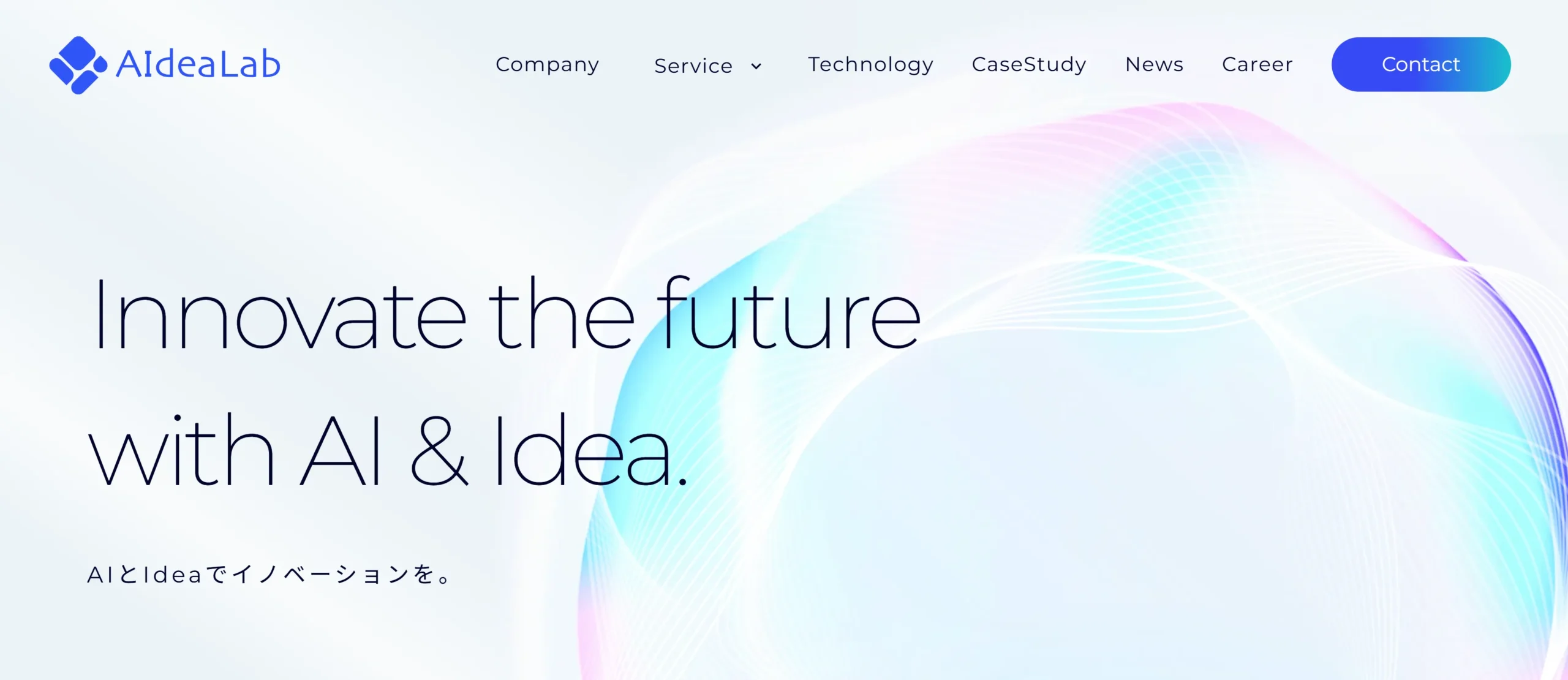
As a research and development startup specializing in generative AI technology experiencing rapid growth, it provides an attractive environment for foreign engineers.
AIdeaLab is a startup that spun out from a Tsukuba University laboratory, with many engineers with academic backgrounds. It develops multiple generative AI products including “AI Picasso” and is popular with engineers who want to work with cutting-edge generative AI technology.
- Founded: 2021
- Headquarters: Chiyoda-ku, Tokyo
- Main Business: Image generation AI, text generation AI, multimodal AI technology R&D
- Recruitment Site Languages: Japanese/English
Features and Benefits
- Cutting-edge technology focus on large language models, diffusion models, and other latest AI technologies
- English environment where development teams use English as the working language
- Research-oriented approach that values both academic approaches and practical application
- Flexible work systems including remote work and flextime
- Startup culture with flat organizational structure and rapid decision-making
KICONIA WORKS Inc.
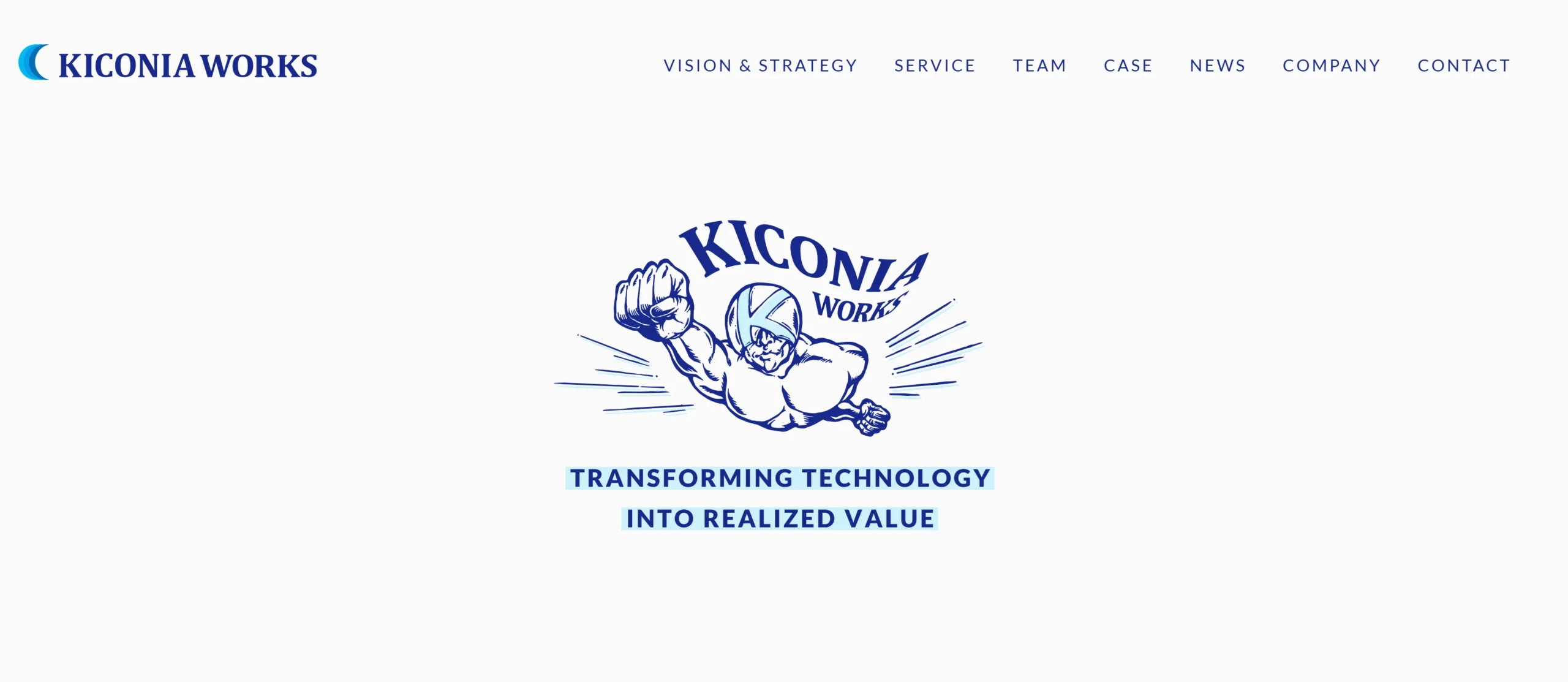
With a small elite AI development team handling over 30 projects annually, it provides a suitable environment for foreign engineers who want to gain practical AI implementation experience.
KICONIA WORKS has particular strengths in image recognition technology and has achievements in AI solution development for manufacturing and retail industries. By handling over 30 AI development projects annually, it’s an environment where you can gain various industry and field AI implementation experience in a short period.
- Founded: 2018
- Headquarters: Shibuya-ku, Tokyo
- Employees: Approximately 20
- Main Business: AI development contracting, image recognition, natural language processing, predictive analysis
- Recruitment Site Languages: Japanese/English
Features and Benefits
- Practice-focused AI development experience in diverse industries
- Knowledge-sharing culture that values sharing development know-how
- Diverse projects covering image recognition, natural language processing, predictive analysis, and other fields
- Small elite team structure providing significant responsibility and growth opportunities
- Speed with faster project progress and decision-making than large companies
ExPlaza Inc.
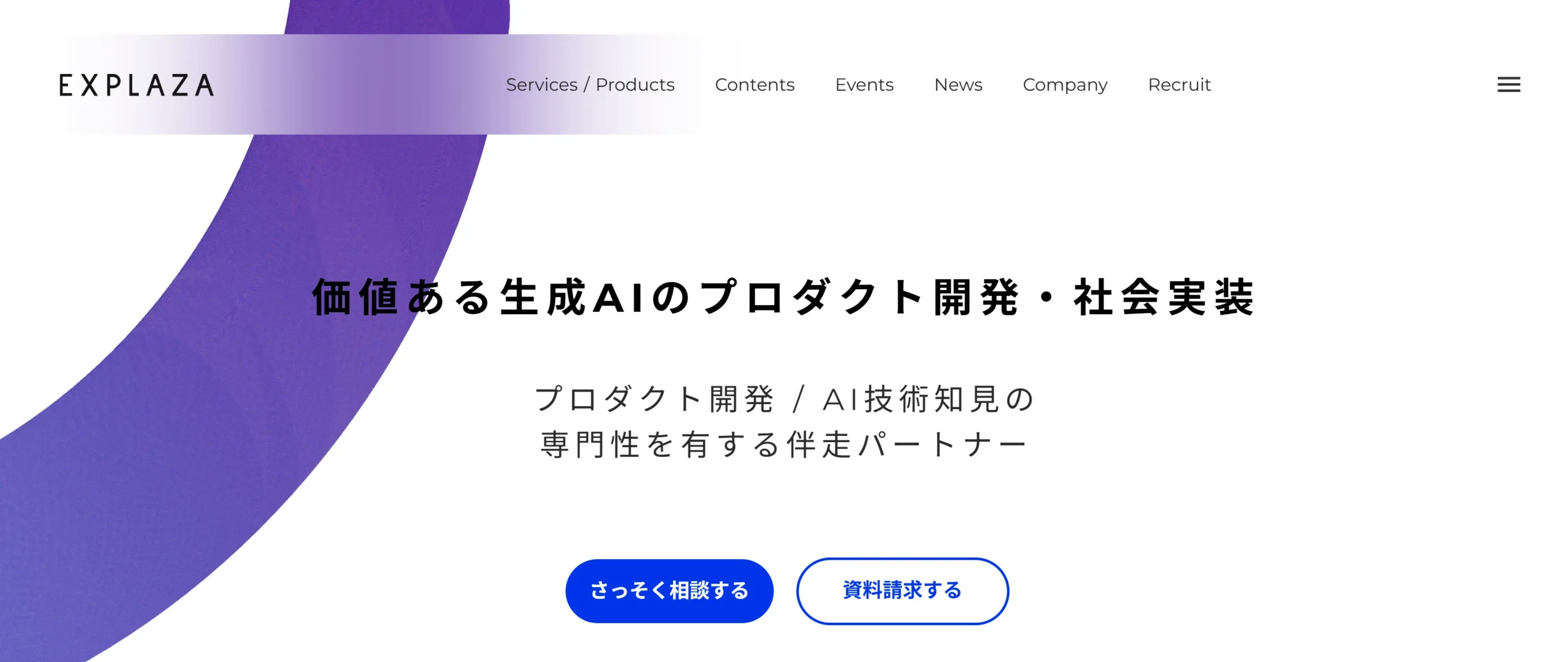
ExPlaza, a startup specializing in generative AI utilization and practical application, is working on AI development that emphasizes business impact.
ExPlaza has particular strengths in large language model (LLM) and RAG (Retrieval-Augmented Generation) technology, with many achievements in enterprise chatbot and AI agent development. It’s an environment where foreign engineers interested in generative AI practical application can hone practical skills.
- Founded: 2020
- Headquarters: Minato-ku, Tokyo
- Main Business: Generative AI utilization support, RAG development, AI agent development
- Recruitment Site Languages: Japanese/English
Features and Benefits
- Generative AI specialization focusing on development using latest LLMs like ChatGPT
- International team with multinational engineer teams and English-centered environment
- User experience focus on comprehensive development including not just technology but UX/UI
- Product orientation enabling experience in both proprietary product development and customer-facing development
- Growth opportunities for building expertise in the rapidly growing generative AI market
Neural Group Inc.
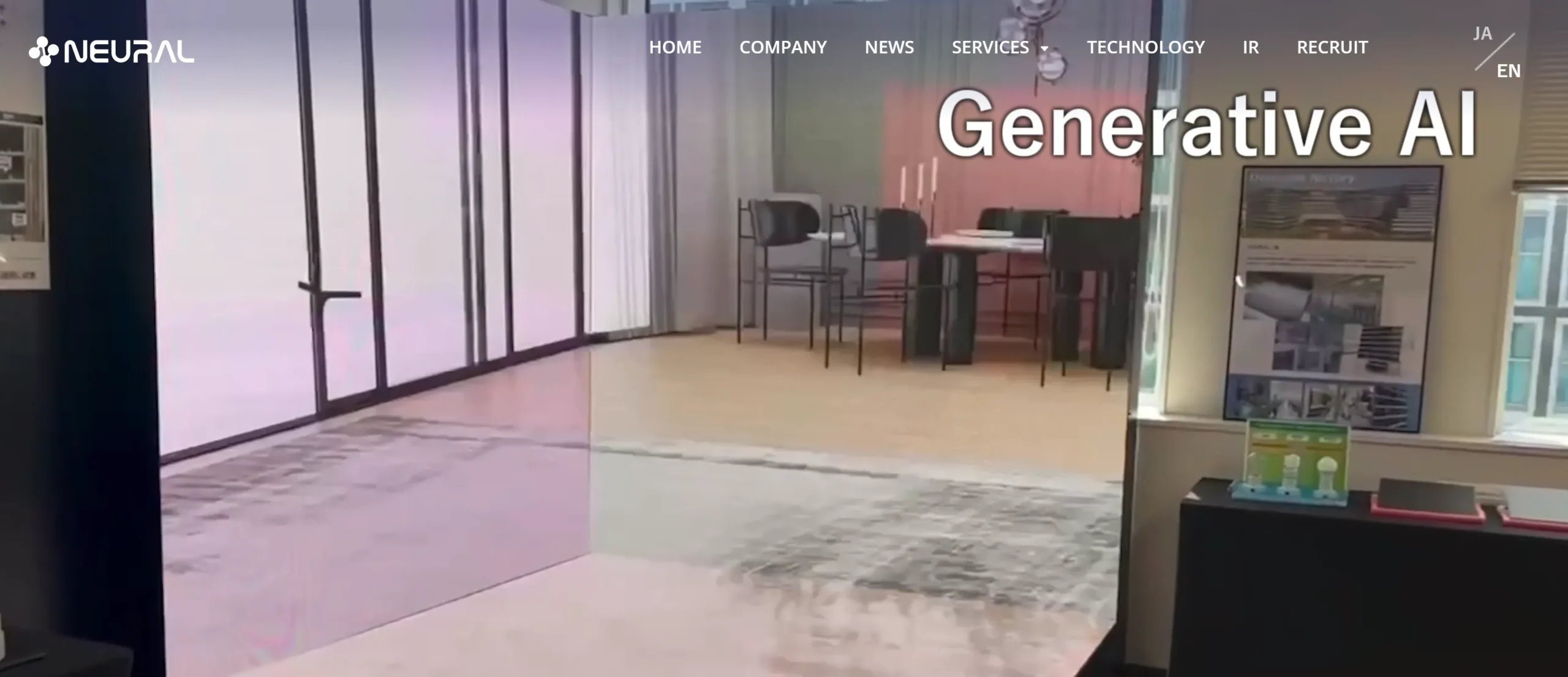
Neural Group, a startup providing AI solutions for industrial machinery, specializes in AI utilization in manufacturing and heavy industry fields.
Neural Group has particular strengths in mission-critical AI solution development such as factory anomaly detection and equipment failure prediction. As a Tokyo Institute of Technology startup with many engineers with academic backgrounds, it’s suitable for engineers who want to engage in technically advanced AI development.
- Founded: 2019
- Headquarters: Chiyoda-ku, Tokyo
- Employees: Approximately 200
- Main Business: Factory anomaly detection AI, predictive maintenance, optimization algorithm development
- Recruitment Site Languages: Japanese/English/Chinese
Features and Benefits
- Industrial AI specialization in AI development for manufacturing, energy, and infrastructure
- International business with business expansion not just in Japan but throughout Asia
- Hardware integration experience in fusion development of sensor technology and AI
- Real-world implementation experience in actual factories and sites
- Technical depth handling specialized technical fields like signal processing and time series analysis
HACARUS Inc.
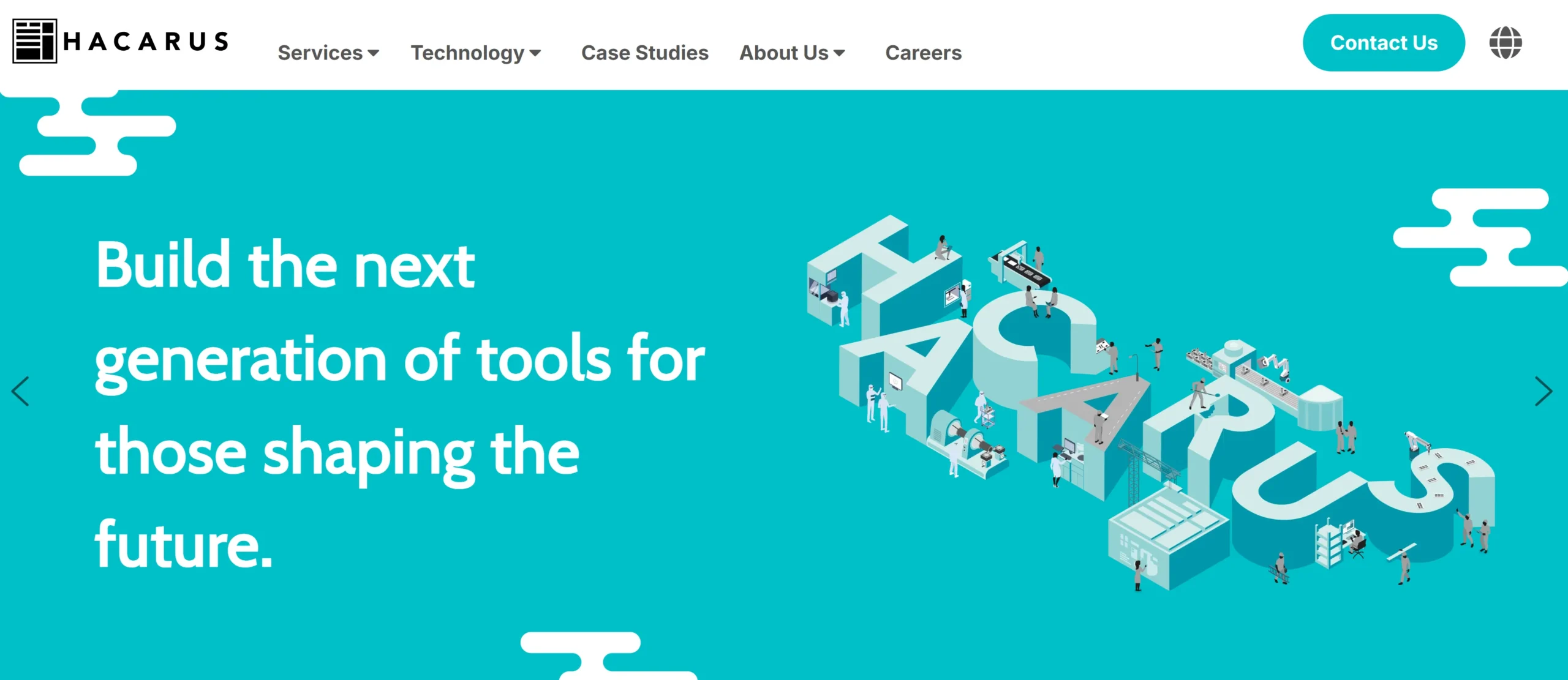
HACARUS, providing lightweight AI solutions for medical and manufacturing industries, is a startup with strengths in sparse modeling technology that enables high-precision analysis even with small amounts of data.
It has particular strengths in algorithm development specialized in medical AI and manufacturing image recognition, conducting many joint research and demonstration experiments with domestic and international medical institutions and manufacturing companies. It’s suitable for foreign engineers interested in effective AI model development with small data amounts or those who want to utilize AI technology in healthcare fields.
- Founded: 2014
- Headquarters: Kyoto City (Tokyo Branch: Minato-ku, Tokyo)
- Main Business: Medical image diagnostic support AI, manufacturing appearance inspection AI, drug development support solutions
- Recruitment Site Languages: Japanese/English
Features and Benefits
- Bilingual communication environment in English and Japanese
- Expertise in sparse modeling technology learnable with small amounts of data
- Engineer teams with diverse backgrounds from Europe, America, and Asia
- Career building opportunities in rapidly growing health tech and manufacturing AI markets
- Corporate culture that values both cutting-edge research and practical application
Career Growth for Foreign Engineers at AI Startups
Working at AI startups provides foreign engineers with career growth opportunities different from major companies.
Startup Career Growth Characteristics
| Aspect | Characteristics | Career Impact |
|---|---|---|
| Responsibility Scope | Wide-ranging, multi-functional | Diverse skill acquisition and T-shaped talent growth |
| Decision Making | Rapid, flat | Improved judgment and decision-making, autonomy development |
| Technology Adoption | Advanced, agile | Early experience with latest technology and expertise building |
| Growth Speed | Rapid, many changes | Short-term experience accumulation and adaptability improvement |
| Career Path | Flexible, fluid roles | Independent career construction suited to oneself |
| Risk | High uncertainty | Risk management ability and adversity resilience acquisition |
Specific Benefits for Foreign Engineers:
- Project Leadership Opportunities: Often get opportunities to lead projects earlier than at major companies
- End-to-End Development Experience: Many opportunities to be involved in all processes from conception to implementation and operation
◎ Example of Mr. A from India:
- Joined as Junior AI Engineer (generative AI development)
- Promoted to image generation AI team leader after 1 year
- Appointed as technical director of proprietary product development after 2 years
- Achieved international conference paper presentations and 2 joint patent applications
◎ Example of Ms. B from the US
- Joined as AI Engineer (RAG development)
- Became lead for major client projects after 1 year
- Currently involved in technical strategy planning as CTO assistant
- Achieved design and construction of proprietary RAG platform and technical blog writing
Career Path Examples After Startup Experience
- Senior position acquisition at major tech companies
- Joining next hot startups (at higher positions)
- Starting own startup
- Independence as consultant or advisor in specialized fields
- Technical advisor appointment at VC (venture capital)
7. The Reality of Foreign AI Engineers Thriving in Manufacturing

Japan’s strength in manufacturing is at the forefront of technological innovation through AI. In the manufacturing industry where AI utilization is rapidly advancing for production efficiency improvement, quality control sophistication, and predictive maintenance realization, demand is increasing for foreign AI engineers who can fuse advanced AI technology with manufacturing site knowledge.
Here, we will explain five major companies leading AI development in the manufacturing industry and the role of foreign engineers in manufacturing innovation using AI.
Five Manufacturing AI Development Companies and Their Characteristics
We introduce five major companies that actively advance AI technology utilization in manufacturing and are positive about recruiting foreign AI engineers. Let’s look in detail at each company’s characteristics, AI development directions, and foreign engineer recruitment status.
FANUC Corporation

FANUC, a global leader in industrial robots and machine tool control devices, is actively investing in realizing smart factories using AI technology.
- Founded: 1972
- Headquarters: Oshino Village, Yamanashi
- Main Business: Industrial robots, CNC systems, robomachines
- AI Application Areas: Predictive maintenance, autonomous control, anomaly detection
Features
FANUC particularly collaborates with Preferred Networks (PFN) to promote development of autonomous control technology for industrial robots through deep reinforcement learning.
Foreign engineers are particularly active in algorithm development and computer vision fields, playing important roles in AI implementation at manufacturing sites.
DENSO Corporation
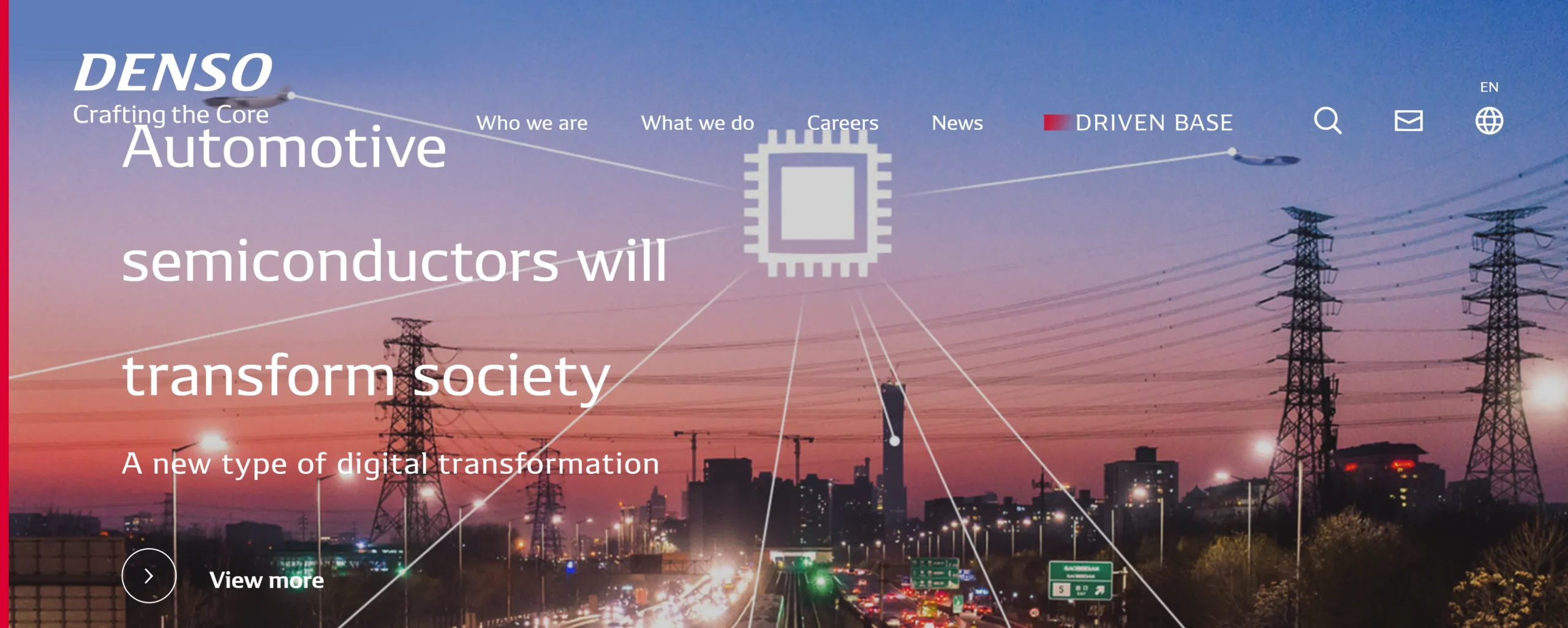
DENSO, an automotive parts manufacturer in the Toyota Group, focuses on quality control of automotive parts and production process optimization using AI technology.
- Founded: 1949
- Headquarters: Kariya City, Aichi
- Employees: Approximately 170,000 (global)
- Main Business: Automotive parts manufacturing
- AI Application Areas: Quality inspection through image recognition, predictive maintenance, autonomous driving technology
Features
DENSO has achieved particularly high results in image recognition AI technology for appearance inspection of automotive parts.
Many foreign AI engineers work at development bases in Tokyo and Aichi, with particular demand for computer vision and deep learning specialists. Foreign engineers with global automotive industry knowledge also play important roles in responding to international technical standards.
OMRON Corporation
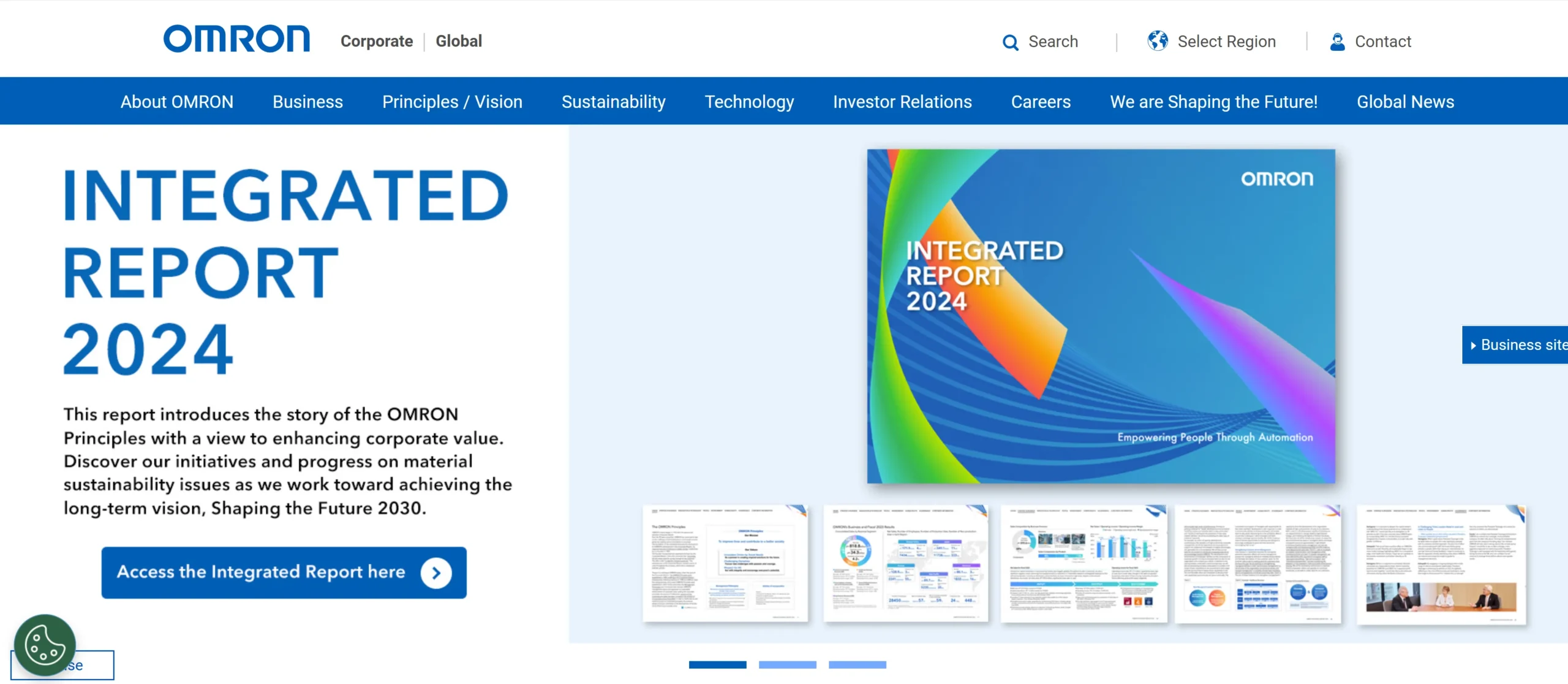
OMRON, a leading company in FA components and sensing technology, is actively working on manufacturing site automation and AI optimization.
- Founded: 1948
- Headquarters: Kyoto City, Kyoto
- Employees: Approximately 28,000 (global)
- Main Business: Control equipment, electronic components, healthcare equipment
- AI Application Areas: Quality control through machine learning, anomaly detection, production optimization
Features
Under the concept of “i-Automation!”, OMRON is advancing development of next-generation manufacturing systems that fuse AI and IoT.
At the Kyoto headquarters and Kusatsu development base, multinational engineer teams collaborate, with foreign engineers playing important roles particularly in machine learning algorithm development and implementation.
Hitachi, Ltd.

Hitachi, a comprehensive electrical manufacturer, actively promotes AI solution development for manufacturing through its IoT platform called Lumada.
- Founded: 1920
- Headquarters: Chiyoda-ku, Tokyo
- Employees: Approximately 268,000 (global)
- Main Business: Information and communication systems, social and industrial systems, electronic devices and systems
- AI Application Areas: Predictive analysis, asset optimization, smart factories
Features
Hitachi has established a particularly global R&D structure, conducting AI development in collaboration with research institutes not only in Japan but also in North America and Europe.
Foreign engineers play central roles particularly in leading global projects and introducing advanced AI technology within the company.
Mitsubishi Electric Corporation

Mitsubishi Electric, an electrical and electronic equipment manufacturer, is advancing development of FA (Factory Automation) systems utilizing AI under the concept of “e-F@ctory.”
- Founded: 1921
- Headquarters: Chiyoda-ku, Tokyo
- Employees: Approximately 150,000 (global)
- Main Business: Power and industrial systems, building equipment, FA equipment, automotive equipment
- AI Application Areas: Production optimization, predictive maintenance, quality improvement
Features
Mitsubishi Electric particularly focuses on edge AI technology, advancing development of lightweight AI algorithms that can be directly embedded in manufacturing site equipment.
Foreign engineers are mainly involved in applied research of the latest AI research to manufacturing sites at the Advanced Technology R&D Center.
Innovation in Manufacturing Using AI and the Role of Foreign Engineers
AI utilization in manufacturing brings not just efficiency improvements but fundamental transformation of production processes.
Contribution Examples in Major AI Application Areas in Manufacturing
- Predictive Maintenance (Machine learning-based equipment failure prediction): American engineer’s development of time series anomaly detection algorithms
- Appearance Inspection (Product quality inspection through image recognition): Chinese researcher’s implementation of high-speed, high-precision defect detection models
- Production Optimization (Production planning optimization through reinforcement learning): Indian engineer’s development of large-scale optimization algorithms
- Digital Twin (Fusion of simulation and actual data): German specialist’s construction of digital twin frameworks
- Supply Chain Prediction (Demand forecasting and inventory optimization): Singaporean data scientist’s development of prediction models
Recently, particularly with the rise of Generative AI, new specialized fields such as large language model (LLM) utilization and RAG (Retrieval-Augmented Generation) system construction are rapidly expanding in addition to traditional AI engineer roles.
Unique Value Foreign AI Engineers Bring to Manufacturing
- Introduction of global cutting-edge technology
- Problem-solving from different perspectives
- Promotion of global expansion
- Advancement of open innovation
Foreign AI engineers with technology and various skills become highly valuable talent in Japan’s manufacturing industry. By acquiring not only technical abilities but also understanding of manufacturing processes and collaboration skills with on-site workers, career possibilities will expand greatly.
8. AI Companies in Finance and Service Industries and Foreign Talent

Alongside manufacturing, the finance and service industries are also fields where AI technology introduction is rapidly advancing. Through data-driven advanced analysis and automation such as fraud detection, risk analysis, customer behavior prediction, and personalization, financial institutions and service industries are advancing business model innovation.
Here, we will explain the recruitment status of financial institutions introducing AI and AI utilization examples in finance and service industries, as well as contributions of foreign engineers.
Five Representative Financial Institutions Introducing AI and Their Characteristics
While the financial industry faces challenges such as strict regulations and complexity of existing systems, it is accelerating AI introduction for competitiveness enhancement. Below, we will look in detail at representative financial institutions actively investing in AI and the working conditions of foreign engineers.
Mitsubishi UFJ Bank, Ltd.

Mitsubishi UFJ Financial Group, Japan’s largest banking group, is actively working on AI technology introduction as part of digital transformation.
- Founded: 1919
- Headquarters: Chiyoda-ku, Tokyo
- Employees: Approximately 30,000 (standalone)
- AI Application Areas: Fraud detection, risk analysis, customer service automation, transaction analysis, anti-money laundering measures
Features
Mitsubishi UFJ Bank particularly focuses on recruiting digital talent as part of its “Digital Transformation” strategy. It also actively recruits foreign AI engineers, particularly seeking talent with both global financial knowledge and advanced AI technology.
Innovation centers established in Silicon Valley and Singapore build global AI talent networks.
Mizuho Financial Group, Inc.
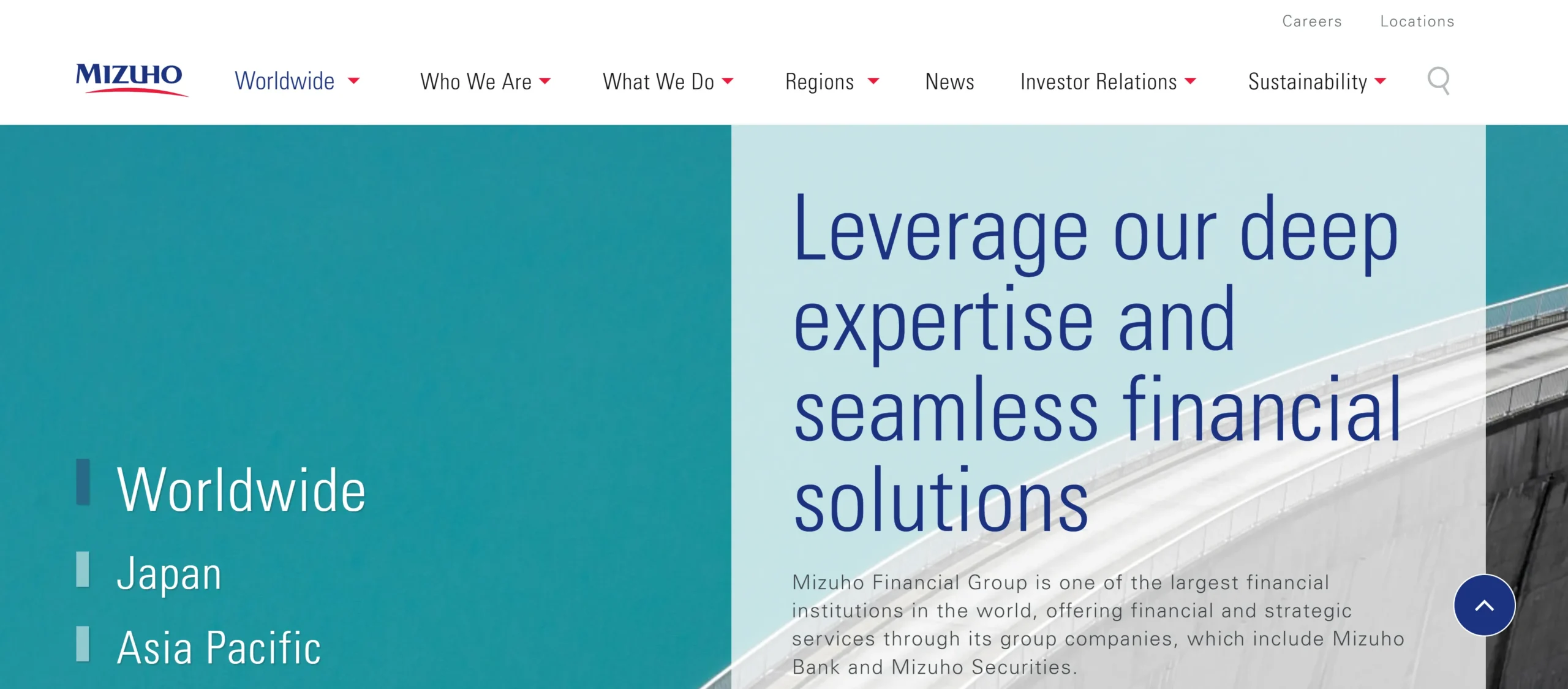
Mizuho Financial Group is also actively promoting AI technology introduction as part of its digital strategy.
- Founded: 2003
- Headquarters: Chiyoda-ku, Tokyo
- Employees: Approximately 52,000 (group-wide)
- AI Application Areas: Credit screening, market forecasting, customer segmentation, business efficiency
Features
Mizuho established a department called “Mizuho Digital Innovation” to conduct R&D on cutting-edge technologies such as AI and blockchain.
Foreign engineers are mainly involved in data analysis and prediction model development, with particular demand for talent with financial engineering backgrounds.
SBI Securities Co., Ltd.
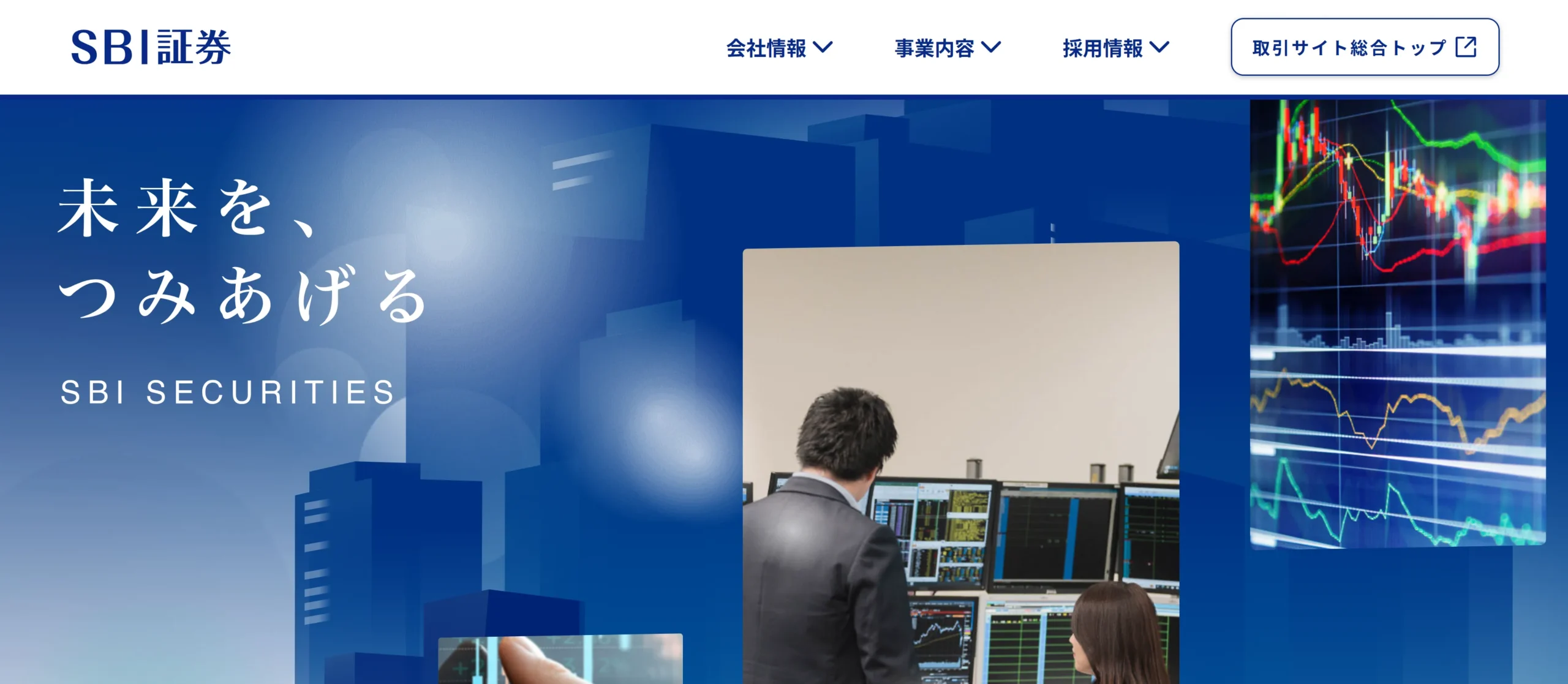
SBI Securities, the largest online securities company, is actively working on AI utilization in the fintech field.
- Founded: 1998
- Headquarters: Minato-ku, Tokyo
- AI Application Areas: Algorithmic trading, robo-advisors, customer behavior analysis, recommendations
Features
The SBI Group is a pioneer in finance and IT fusion, actively investing in cutting-edge technologies such as AI and blockchain, including the acquisition of “Shinsei Bank Group.”
Particularly in algorithmic trading and asset management robo-advisor fields, many foreign engineers are active, with development utilizing knowledge of international financial markets.
Sompo Japan Insurance Inc.

Sompo Japan, a major non-life insurance company, is actively introducing AI technology as one of the companies leading digitalization in the insurance industry.
- Founded: 1888
- Headquarters: Shinjuku-ku, Tokyo
- Employees: Approximately 20,000
- AI Application Areas: Insurance assessment automation, risk analysis, abnormal weather prediction, fraudulent claim detection
Features
Sompo Japan is conducting advanced initiatives particularly in areas such as automobile insurance assessment efficiency improvement using image recognition technology and natural disaster risk prediction through weather data analysis.
At the Silicon Valley innovation lab, R&D on cutting-edge technology is conducted mainly by foreign engineers.
Money Forward, Inc.

Money Forward, which achieved rapid growth from a fintech startup, actively utilizes AI technology in expanding from personal household budget apps to corporate accounting and expense settlement services.
- Founded: 2012
- Headquarters: Minato-ku, Tokyo
- AI Application Areas: Receipt/invoice OCR, asset management optimization, fraud detection, expenditure prediction
Features
As a rapidly growing fintech company, Money Forward is expanding business while balancing startup culture and enterprise business.
Foreign engineers are particularly active in OCR technology and financial data analysis fields, characterized by balancing startup-like high freedom environments with stability close to large companies.
AI Companies in Finance and Service Industries and Foreign Talent Contributions
AI technology introduction is advancing not only in financial institutions but also across a wide range of service industries. Here, we introduce specific examples of AI utilization in finance and service industries and contributions of foreign engineers.
Example from Mitsubishi UFJ Bank
AI Technology Introduction in Financial Transaction Fraud Detection Systems
- Purpose: Improve detection rates of financial crimes and reduce false positive rates
- Technology: Anomaly detection through deep learning, transaction relationship analysis through graph neural networks
- Results: Improved fraud detection rates, reduced false positive rates
Foreign Engineer Contributions: A Singaporean AI engineer team analyzed global financial crime characteristics and developed adaptive models that can learn regional fraud patterns. They significantly contributed to detecting complex money laundering patterns in international remittances, contributing to improved detection accuracy.
The success of this project led the bank to further expand recruitment of foreign engineers and strengthen innovation centers in Singapore and Silicon Valley.
Skills Specific to Finance and Service Industries Required for AI Engineers
- Finance/Service Domain Knowledge: Basic knowledge of financial products, risk management, regulatory requirements
- Data Security and Privacy: Safe handling of personal information and financial data
- Regulatory Compliance: AI development compliant with financial regulations (GDPR, Personal Information Protection Law, etc.)
- Explainable AI: Model design that can explain the basis for financial decisions
- Real-time Processing: AI design for real-time processing of financial transactions and service responses
The finance and service industries are fields where technology-driven transformation is rapidly advancing, and for foreign AI engineers, combining advanced AI knowledge with industry knowledge opens up significant career opportunities.
Particularly, talent familiar with international financial knowledge and global technology trends can play important roles in strengthening the international competitiveness of Japanese finance and service companies.
9. Job Hunting in Japanese AI Companies: Application Strategies for Foreign Engineers

For foreign AI engineers considering employment or career changes at Japanese AI companies, understanding Japan-specific recruitment processes and corporate culture is very important. Success requires not only technical ability but also appropriate approaches and preparation.
Here, we will explain in detail strategies for foreign AI engineers to effectively apply to Japanese companies and points that recruiters actually value.
Effective Approaches When Applying to Japanese AI Companies
Effective approaches when applying to Japanese AI companies require preparation and strategy beyond simple job applications. Below, we introduce specific strategies for each stage from pre-application preparation to interviews.
Important Points for Pre-Application Preparation
Company Research
Investigate languages, frameworks, and tools used by target companies in advance to confirm matching with your skill set.
Portfolio Preparation
Create bilingual Japanese-English GitHub profiles. Explain representative projects in detail and improve code readability. Also write technical articles and organize project examples.
Networking Strategy
Participate in Japanese AI communities and optimize LinkedIn.
Resume Customization for Japan
- Prepare bilingual Japanese-English versions
- Adapt to Japanese resume formats
- Use concise, readable layouts
Work History
- Record chronological career history
- Specific responsibilities and achievements in each role
- Record team size and degree of personal contribution
- Emphasize teamwork and collaboration examples
- Long-term project commitment attitude
- Specific examples demonstrating problem-solving abilities
Language Strategy
Prioritize acquiring basic business Japanese and focus on learning technical terms and industry vocabulary.
AI Engineer Interview Preparation
Technical Interview Preparation:
- Review algorithms and data structures
- Confirm basic machine learning theory
- Practice coding problems
AI-Specific Preparation:
- Practice explaining model design and evaluation methods
- Prepare problem-solving approaches with real data
- Practice algorithm explanations on whiteboards
Cultural Interview
Understanding Japanese corporate hierarchical structures and decision-making processes, and the importance of teamwork and cooperation is crucial.
Self-Introduction and Motivation
Include connections with Japan and interest in Japanese culture, long-term career vision and commitment to the company, and empathy with corporate values and missions.
■ Related Reading
The following article provides guidance on interview preparation for Japanese companies and how to write resumes and work history documents.
10. Japanese AI Companies Offer Opportunities for Foreign AI Engineers to Thrive
Japan’s AI market is rapidly expanding, and opportunities for foreign AI engineers to thrive will continue to grow. Demonstrating not only technical ability but also teamwork and long-term commitment leads to success at Japanese companies.
Overcoming language and cultural barriers and learning Japan’s unique values and methodologies should become valuable assets in global career development.

